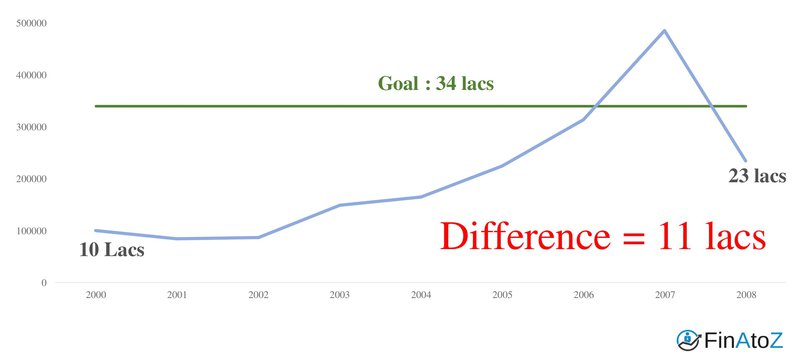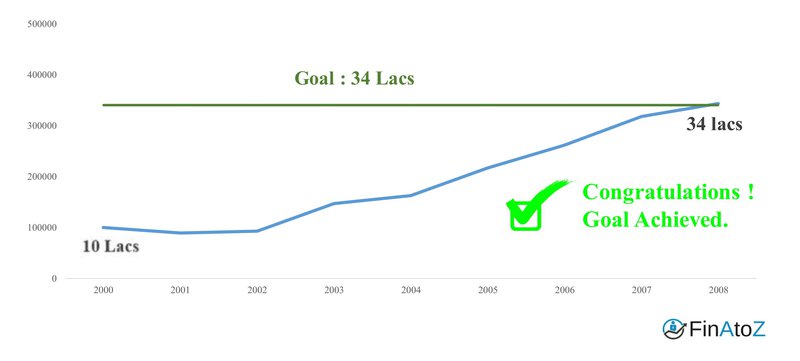Goal based exit - Your best shield against market volatility

It is but natural that any big fall in equity market will make an investor nervous. Sometimes the fall is big enough to unnerve the investor in a way that she may start questioning the probability of achieving even long-term goals. As financial planning activity your financial advisor might have assumed a return of say 11% for your long-term financial goals. However, after a market crash the portfolio returns may be miles behind.
So, how do you get the confidence that your long-term goal planning is secure? The matter becomes worse when a goal is maturing just after a big crash. Does it mean that long term goal planning is a farce? What needs to be done to take care of black swan events that are completely unpredictable? How to ensure that your financial goals are secure? Let’s try to find some of these answers from the following story:
Story of Veer and his friend Jai
Veer started investing in 2000 for his daughter’s higher education. The amount required was 34 Lacs in 2008. He arduously reviewed many financial products and consulted few of his knowledgeable friends before narrowing down on investments in mutual funds. Since, 8 years was a good long-term horizon, he was advised to invest using monthly Systematic Investment Plan (SIP) of a fixed amount for the next 8 years. He did further research to select some 'five-star rated' funds & started investing.
Fast forward 8 years. He found, to his horror, that he was not even getting inflation adjusted returns on his investments. Even though he followed the so called “expert advice” and invested with complete discipline, he was terribly short of the required goal amount. He was disappointed that he had to go for a bank loan to cover the shortfall. This would be a big strain on his finances and may even jeopardize his future financial goals.
He shared his experience with his friend Jai, who was a professional financial advisor. Initially Jai consoled him and told him that equity market is not every one’s cup of tea. Not everyone makes money out of this volatile asset class. However, Veer pressed Jai to help him understand what went wrong in his financial journey. Was there any way he could have avoided this ugly experience?
So, Jai invited Veer to his home for a 'Chai pe Charcha'. Soon they were sipping tea on a beautiful Sunday morning at Jai's place.
“Let’s see, what you could have done better to manage your investments!”, exclaimed Jai.
“You started your investment journey well by planning for a goal. You also selected a very good product i.e. equity mutual funds. Mutual fund is a much better product as compared to traditional products like FD, Child Plans etc. Especially, when the duration of investment is longer than 5-7 years. You also calculated the monthly investment required as Rs. 23000 which is correct as per my calculations as well”. A SIP of 23,000 would have given you a final corpus of 34 Lacs at an expected return of 11% per annum.”
“So, what went wrong”, Jai continued lighting up his favourite cigar. “First thing you did wrong - You did not track your investment portfolio. You just chose few funds based on some half-cooked research. And then continued with the same funds for the entire 8 years. Sorry to say, you had no clue about the performance of your selected funds. You didn’t even notice that the fund manager who was managing one of these funds left and joined a competitor. Similarly, you did not notice that few of your funds performed much poorly than the Sensex. You should have redeemed your money from such funds and reinvested in better managed funds”. Saying this Jai put a soft pat on Veer’s back.
“So problem was that I did not track my investment portfolio", sighed Veer.
“Umm, not exactly! You could have still achieved your goal even with below par performance of your chosen funds.” Jai noticed a puzzled look in Veer’s face as he said this.
“Now I am giving you a very important lesson that took years for me to learn - Although, I am a financial advisor by profession”, proclaimed Jai. “One thing that often investors miss is planning for a prudent exit strategy for their investments. Investing into a volatile asset class like equity without a proper exit strategy is akin to entering into a Chakravyuh without knowing how to come out of it. So, my dear friend, you were like Abhimanyu who entered a Financial Chakravyuh. Unfortunately, no one taught you how to exit”.
“Lets see what happened to your investment portfolio.”
Without proper Goal based exit plan

“If you observe the above chart, you could see that at one point you had achieved almost 50 Lac corpus which was even higher than your requirement. Even then you fell short of 11 Lacs. The reason for the shortfall was the market crash in the last one year of your investment journey. What you should have done was to move money into safe asset class like debt when your goal due date started approaching”.
“Lets have a look at how your investment portfolio would have looked like with a proper Goal based exit plan”.
With proper Goal based exit plan

“If you had followed a proper goal based exit plan, you would have started moving part of your assets into debt much before the maturity date of your goals. You would have moved around 50% of your assets into debt at least 3 years before the maturity date. Then every year, you would have moved around 25% more into debt. So, by 2007 end, you would have moved 100% of your investments into debt. This way you would have got completely insulated from the market crash of 2008 and easily achieved your target amount of 34 Lacs in 2008”.
“This is mind boggling”, exclaimed Veer. “However, I have a doubt. What if the markets would have crashed in 2005 instead of 2008. As per your exit plan, I should have moved 50% of my investments into debt by the end of 2005. In that case, I would have still fell short by a couple of Lacs. So, how is your goal exit plan fool-proof?”, questioned Veer.
Hearing this Jai had a soft smile on his face. Jai said, “If I tell you all my trade secrets then what would I do for a living?”.
Jai continued “Anyway you know very well that I can’t resist explaining it to you 😊”. “The answer is simple, you can’t have one size fit all. As a financial advisor we have a robust Goal based exit framework that takes care of all such scenarios. What we would do is to adjust our goal based exit strategy to the market conditions. Our aim is to achieve the target amount with a very high probability. There is only a small chance that we may still fall short. However, even in the above example that you quoted, you would have fell short by just 2 Lacs. This is much lower as compared to 11 Lacs that you fell short currently. Using a robust goal based exit framework we could have further reduced the shortfall to a much lower value. In the rare event of a small shortfall, we could have still managed your goal with some fine tuning of your future goals. Most importantly your future goals would not have got jeopardized.”
“Maybe I’ll share few more advanced techniques with you in one of our future Sunday tea party!”, concluded Jai while putting down his cup of tea and getting ready for his Sunday home chores.




